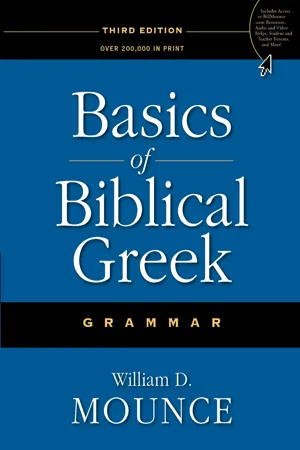![]()
Chapter 1
The Greek Language
The Greek language has a long and rich history stretching all the way from the thirteenth century B.C. to the present. The earliest form of the language is called “Linear B” (13th century B.C.). The form of Greek used by writers from Homer (8th century B.C.) through Plato (4th century B.C.) is called “Classical Greek.” It was a marvelous form of the language, capable of exact expression and subtle nuances. Its alphabet was derived from the Phoenician’s as was that of Hebrew. Classical Greek existed in many dialects of which three were primary: Doric, Aeolic, and Ionic (of which Attic was a branch).
Athens was conquered in the fourth century B.C. by King Philip of Macedonia. Alexander the Great, Philip’s son, was tutored by the Greek philosopher Aristotle. Alexander set out to conquer the world and spread Greek culture and language. Because he spoke Attic Greek, it was this dialect that was spread. It was also the dialect spoken by the famous Athenian writers. This was the beginning of the Hellenistic Age.
As the Greek language spread across the world and met other languages, it was altered (which is true of any language). The dialects also interacted with each other. Eventually this adaptation resulted in what today we call Koine Greek. “Koine” (κοινή) means “common” and describes the common, everyday form of the language, used by everyday people. It was not considered a polished literary form of the language, and in fact some writers of this era purposefully imitated the older style of Greek (which is like someone today writing in King James English). Koine was a simplified form of Classical Greek and unfortunately many of the subtleties of Classical Greek were lost. For example, in Classical Greek ἄλλος meant “other” of the same kind while ἕτερος meant “other” of a different kind. If you had an apple and you asked for ἄλλος, you would receive another apple. But if you asked for ἕτερος, you would be given perhaps an orange. It is this common Koine Greek that is used in the Septuagint, the New Testament, and the writings of the Apostolic Fathers.
For a long time Koine Greek confused scholars because it was significantly different from Classical Greek. Some hypothesized that it was a combination of Greek, Hebrew, and Aramaic. Others attempted to explain it as a “Holy Ghost language,” meaning that God created a special language just for the Bible. But studies of Greek papyri found in Egypt over the past one hundred years have shown that this language was the language of the everyday people used in the writings of wills, private letters, receipts, shopping lists, etc.
There are two lessons we can learn from this. As Paul says, “In the fullness of time God sent his son” (Gal 4:4), and part of that fullness was a universal language. No matter where Paul traveled he could be understood.
But there is another lesson here that is perhaps a little closer to the pastor’s heart. God used the common language to communicate the gospel. The gospel does not belong to the erudite alone; it belongs to all people. It now becomes our task to learn this marvelous language so that we can more effectively make known the grace of God to all people.
![]()
Chapter 2
Learning Greek
Before we start learning Greek, let’s talk about how to learn. If you have developed any bad study habits, they are going to be magnified as you set out to learn Greek.
Goal
The main purpose of writing this book is to help you to understand better and to communicate more clearly the Word of God. This must be kept in mind at all times. It should motivate you, encourage you when you are frustrated, and give you perspective when you think you are going to crack. Remember the goal: a clearer, more exact, and more persuasive presentation of God’s saving message.
But is knowing Greek essential in reaching this goal? If you are not fully convinced that this is so, you will have difficulty reaching the goal. In other words, is knowing Greek worth the effort? We have been blessed with a wealth of good translations. A careful use of these goes a long way in helping the preacher understand the Word of God. It would be unfair to claim that the only way to be a good preacher is to know Greek.
However, allow me a little parable and the point will become clear. You need to overhaul your car engine. What tools will you select? I would surmise that with a screw driver, hammer, a pair of pliers, and perhaps a crow bar, you could make some progress. But look at the chances you are taking. Without a socket wrench you could ruin many of the bolts. Without a torque wrench you cannot get the head seated properly. The point is, without the proper tools you run the risk of doing a minimal job, and perhaps actually hurting the engine.
The same is true with preaching, teaching, and preparing Bible studies. Without the proper tools you are limited in your ability to deal with the text. When Jesus says of communion, “Drink ye all of it” (Matt 26:27; KJV), what does the “all” refer to? All the drink, or all the people?1 When Paul writes to the Ephesians that it is “by grace you have been saved through faith, and this is not of yourselves; it is a gift from God” (Eph 2:8), what does “it” refer to?2 When Paul asks, “Do all speak in tongues?” (1 Cor 12:30), is he implying that the answer is “Yes”?3
But there is more. Almost all the best commentaries and biblical studies require a knowledge of Greek. Without it, you will not have access to the lifelong labors of scholars who should be heard. I have seen a rather interesting pattern develop. The only people I have heard say that Greek is not important are those who do not themselves know Greek. Strange. Can you imagine someone who knows nothing about tennis say that it is unnecessary ever to take tennis lessons? Sounds ridiculous, doesn’t it?
The point of all this is to emphasize that you must think through why you want to learn Greek, and then you must keep your goal in sight at all times. John Wesley, perhaps one of the most effective ministers ever to mount a horse, was able to quote Scripture in Greek better than in English. How far do you want your ministry to go? The tools you collect, Greek being one of them, will to a significant degree determine your success from a human point of view. Set your goals high and keep them in sight.
Memorization
In order to learn any language, memorization is vital. For Greek you will have to memorize vocabulary words, endings, and various other things. In Greek the only way to determine, for example, whether a noun is singular or plural, or if a word is the subject or object of the verb, is by the ending of the word. So if you have not memorized the endings, you will be in big trouble.
Along with grammar is the importance of memorizing vocabulary. There is little joy in translating if you have to look up every other word in the lexicon. Rote memory is more difficult for some than others, so here are some suggestions.
1. Make flash cards for vocabulary words and word endings. You can put them in your pocket and take them anywhere. Use them while waiting in lines, during work breaks, before classes, etc. They will become your life saver. 3 x 5 index cards cut in thirds are a nice size. You can also purchase my pre-made cards, Basics of Biblical Greek Vocabulary Cards (Zondervan).
2. Use FlashWorks, my computer flash card software that can be downloaded for free (see page xxii). You can tell it which words you have difficulty remembering, and it can quiz you just on those.
3. When memorizing words use mnemonic devices. For example, the Greek word for “face” is transliterated as prosōpon, so it could be remembered by the phrase, “pour soap on my face.” It seems that the sillier these devices are the better, so don’t be ashamed. At Teknia.com you can see all my mnemonic devices and contribute yours. I encourage you to become involved in this community.
4. You must pronounce Greek consistently and write it neatly. If your pronunciation varies, it is difficult to remember the words.
5. Say the words and endings out loud. The more senses involved in the learning process the better. So pronounce the words, listen to them, and write them out so you can see them.
Exercises
The greatest motivation for learning Greek comes during the homework assignments. Because most of the exercises are drawn from the New Testament, you are constantly reminded why you are learning the language. I have tried to point out in the footnotes whenever a knowledge of Greek helps you exegetically or devotionally to better understand the verse’s meaning.
I will also be introducing you to intermediate grammar through the footnotes to the exercises. Whereas the footnotes in the grammar are not essential, they are very important in the exercises.
Be sure to treat the exercises as tests. Learn the chapter, do as many of the exercises as you can, then work back through the chapter and do the exercises again. The more you treat the exercises as a test, the better you will learn the material and the better you will do on actual tests. There are many sample quizzes available on the website.
Time and Consistency
Very few people can “pick up” a language. For most of us it takes time, lots of it. Plan for that; remind yourself what you are trying to do, and spend the necessary time. But along with the amount of time is the matter of consistency. You cannot cram for tests; Greek will not stick, and in the long run you will forget it. Spend time every day; getting to know the language of the New Testament deserves at least that. Remember, “Those who cram, perish.”
Partners
Few people can learn a language on their own. For sake of illustration, let me quote the story of John Brown as told by the great Greek grammarian A. T. Robertson.
At the age of sixteen John Brown, of Haddington, startled a bookseller by asking for a copy of the Greek Testament. He was barefooted and clad in ragged homespun clothes. He was a shepherd boy from the hills of Scotland. “What would you do with that book?” a professor scornfully asked. “I’ll try to read it,” the lad replied, and proceeded to read off a passage in the Gospel of John. He went off in triumph with the coveted prize, but the story spread that he was a wizard and had learned Greek by the black art. He was actually arraigned for witchcraft, but in 1746 the elders and deacons at Abernethy gave him a vote of acquittal, although the minister would not sign it. His letter of defence, Sir W. Robertson Nicoll says (The British Weekly, Oct. 3, 1918), “deserves to be reckoned among the memorable letters of the world.” John Brown became a divinity student and finally professor of divinity. In the chapel at Mansfield College, Oxford, Brown’s figure ranks with those of Doddridge, Fry, Chalmers, Vinet, Schleiermacher. He had taught h...

